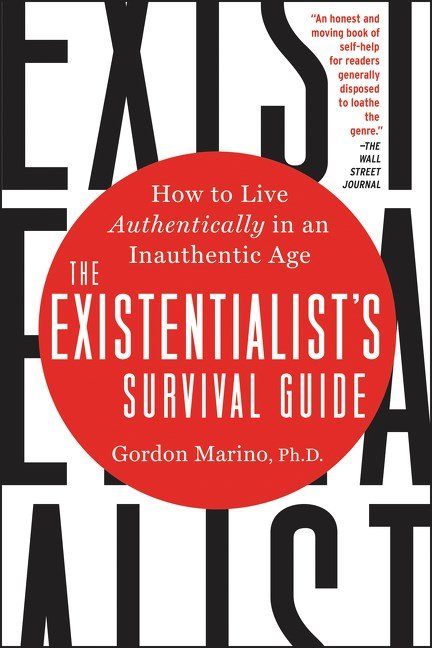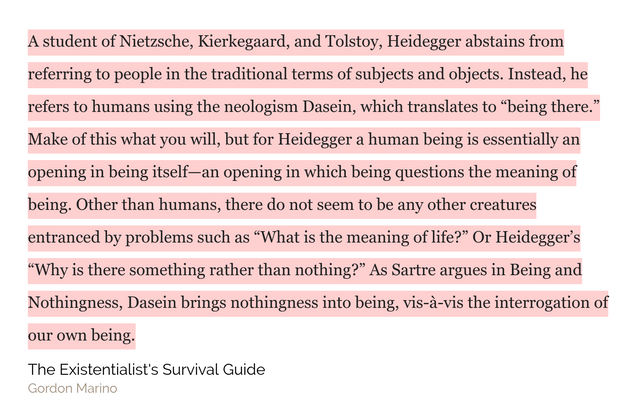
The following quote is from Gordon Marino's so-far excellent The Existentialist's Survival Guide : How to Live Authentically in an Inauthentic Age:
Among my suburban cohort and students, the once-urgent issue of authenticity seems to have been lost to selfies, social media branding, and managing your profile on LinkedIn and Facebook, as though everyone has become their own unabashed publicist. It is not who you are but who you seem to be! A well-known Generation X author, Chuck Klosterman, remarked, “I honestly believe that people of my generation despise authenticity, mostly because they’re all so envious of it.”
Today, the piety is “Follow your passions. Do what you love.” Everyone is enjoined to have some dream about their life, and you are authentic to the extent that you doggedly pursue that vision as though it were your essence. Accordingly, Paul Gauguin may have been a creep for leaving his family to paint in Tahiti, but he was acting authentically.
There are many philosophical theories about authenticity; however, I don’t need a theory to recognize that I have spent much of my life sparring with the fear of being inauthentic. Motored by profound insecurities and by sheer dint of the enormous effort that insecurities can mobilize, I made it into precincts both in sports and academia in which I felt like I didn’t belong, and sometimes rightly so. One late autumn afternoon in the early 1980s, my authenticity hang-ups burst out of the closet and nearly uprooted my future.
When Philip Rieff took me under his wing, it felt like a benediction, one that I surely let all my fellow graduate students know about. A figure cast from Downton Abbey, Rieff was extremely formal in both dress and manner, sometimes sporting a top hat and monocle. Though he was an intellectual renegade of sorts—not unlike Kierkegaard—Rieff was devout in his belief that decorum was the last wall of defense between the barbarians in- and outside of us. No “ums” or stumblings in his diction; Rieff was hypnotic. He spoke as though he were reading from a book, a very good book. Decades later, he would write a lengthy volume on charisma, a quality he possessed in great measure, and those of us who studied with him felt the full weight of it in his presence.
One afternoon, Rieff instructed me to meet him to discuss a paper I was writing on Freud and Kierkegaard. Nervously, I ambled into his office clad in jeans, a dashiki, and a single gold earring. Rieff took one glance at me and pulled a face as though he had just bitten into a lemon. “Why do you carry yourself and dress like a thug?” Sniggering, he continued, “And why are you wearing that silly earring?” Interestingly enough, he had seen me dressed like this before but was mum. Either he thought my sartorial tendencies were an aberration or more likely he calculated that I was now attached enough to him that he could criticize me without my doing something self-destructive. Jumped by anxiety, I bumbled an inanity along the lines that the earring was a symbol. “A symbol!” Rieff chortled. “Ten years from now everyone in the business school will be wearing one. A symbol of what?” he asked acerbically. “If you think it is a symbol, then you must know something about its history.” He quizzed, “What do you know about these earrings?” Flummoxed, I shrugged. After a few moments of screaming silence, Rieff delivered a short history of the earring, explaining that it was common among the peasants where my ancestors had come from in southern Italy.
You should not implicitly trust memoirs, mine included. Try as we might, conversations from years past are always part fiction. In this case, I cannot recall my exact words, but I vaguely remember uttering something to the effect that, even though I was in a doctoral program at an elite university, I intended to stay true to my background. Even today, I occasionally hear sports celebrities take this tack, pledging that just because they signed a seven-figure contract and live in mansions in the exurbs, they have not forgotten their roots. Without blinking, Rieff peered at me through his thick glasses, placed his long, slender fingers on his desk, and said—and this is verbatim—“Mr. Marino, it’s time you started identifying up.” Much as I stood in awe of the man, I was now an impulse away from leaping up and telling him where he could stick his identification sermon.
In my addled mind, I was trying to remain authentic, trying to stay true to who I thought I was—maybe some mildly erudite version of a working-class hero. Rieff must have been right that the attachment was secure because something stopped me from the kind of outburst I was given to, one that would have exploded a relationship that molded my life in positive, otherwise-unimaginable directions.
Is the litmus test of authenticity the gap between who we feel we are and who we present ourselves to be? Camus meditated long and hard on authenticity. Meursault, the protagonist of The Stranger—arguably Camus’s most famous character—commits a senseless murder but, in the end, is sentenced to death largely because he refuses to tell the magistrate and others what they want to hear, namely, that he is sorry. Meursault will murder but he won’t divulge feelings he does not have. “Above all,” Camus wrote in his Notebooks, “in order to be, never try to seem.” That advice is easier written than followed.

There is so much that this wondrous and radiant book provides, that I urge you to purchase a copy now:
Posted from my blog with SteemPress : https://niklasblog.com/?p=24157
Hi pivic,
Visit curiesteem.com or join the Curie Discord community to learn more.
Downvoting a post can decrease pending rewards and make it less visible. Common reasons:
Submit
Congratulations @pivic! You have completed the following achievement on the Steem blockchain and have been rewarded with new badge(s) :
You can view your badges on your Steem Board and compare to others on the Steem Ranking
If you no longer want to receive notifications, reply to this comment with the word
STOPVote for @Steemitboard as a witness to get one more award and increased upvotes!
Downvoting a post can decrease pending rewards and make it less visible. Common reasons:
Submit
Wow what a magnificent post! And with appropriate appointments for personal reflection.
Are we really authentic or are we at the same time what social networks drive us to be?
Before, perhaps this same approach was made but in the context of social groups. Today social groups can be virtual platforms but the basic problem of authenticity is theoretically the same.
Very good this review of the book by Gordon Marino. Best regards @pivic
Downvoting a post can decrease pending rewards and make it less visible. Common reasons:
Submit